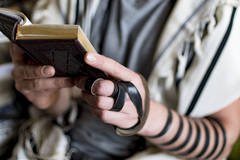President's message 7.15.22
| Author | |
| Date Added |
Dear friends,
Parshat Balak recounts the story of Bilaam, the greatest gentile prophet, and the plot of Balak, the king of Moab, to use Bilaam to curse the Jewish People. We learn that Bilaam is reluctant to go, saying that even if given storehouses of gold and silver, he couldn't go without Hashem's permission. Eventually, Hashem reluctantly allows Bilaam to go, and he quickly saddles his ass and embarks to Moab.
On the way an angel blocks his path, seen initially by the ass only, and causes Bilaam to repeatedly beat the ass until his eyes are opened to reveal the angel before him. The angel instructs him to go, but to only say the word of Hashem. In this way, all of the curses that Balak had wished to be brought on the Jewish People become blessings. The plan is thwarted.
There are two facets of the story that immediately jump out. The first involves Hashem's anger at Bilaam and the second involves the angel. Bilaam initially refused to go to Moab, and only agreed when Hashem gave him permission. Then, several verses later, we read that Hashem was incensed that Bilaam was going. But why, when he had just given permission?
Rabbi Mordechai Kamenetzky writes that Hashem was upset not by Bilaam’s actions but by his attitude. He doesn't reluctantly go to Moab, but rather wakes early, saddles his own ass and sets out as soon as possible. Now that he has permission, the storehouses of gold and silver are as good as his. Rabbi Kamenetzky teaches that just having permission, or even tacit approval to do something, does not mean that it’s right. We have to use our moral compass to decide what should be done and not simply allow the opportunities that are presented to us to dictate our actions.
Thn there's the appearance of the angel. Our sages tell us that Bilaam was a great prophet, rivalling Moshe. How is it that he did not see the angel when his ass did, and that he didn't even consider why his ass was behaving unusually… even when the ass starts speaking to him? How was he so blind?
Rabbi Kamenetzky learns from this interaction that, while miracles happen all around us, we have to be open to seeing them. When we are focused on our own goals and opportunities, we don't appreciate what is happening around us. When a great visionary like Bilaam can be caught up in mundane pursuits and not appreciate the miracles around him, how much more are we at risk of focusing on the trees and missing the forest?
Rabbi Kamenetzky writes that Bilaam was only interested in his honor and would have slaughtered his donkey on the spot. We need to open our eyes to what is around us, and use our moral compass to decide the right path forward. (For the full dvar Torah, click here .)
• • •
Back home now, planning for the summer and the High Holidays continues. We are still collecting money pledged for the annual fundraiser but I can tell you that, to date, we have raised over $175,000 after expenses. We have already given over $40,000 to Chabad of Brooklyn Heights, and there will be additional payments as more pledges come in and the expenses are finalized. This is a great achievement and a credit to our community and the love that we all have for our Shul. I deeply thank all who contributed, especially the matchers and the fundraising committee.
The next Board meeting is scheduled for July 25th. In addition to the standard topics, we will be finalizing job descriptions, and hopefully identifying additional individuals to help run the Shul. We will also be finalizing a code of conduct and discussing security measures that can be implemented to improve our safety. I will be sending out the agenda next week, in advance of the meeting, so members can comment and request additional topics to be discussed at the meeting.
The Siyyum BBQ sponsored by the Daf Yomi group is scheduled for Sunday afternoon, July 31 (an opportunity to eat meat during the Nine Days). It is free and open to all. Details to follow.
Wishing you all a peaceful and meaningful Shabbat Shalom,
Steven Inker
At Bnai Avraham: The OU's Rabbi Weinreb talks about the Rebbe
| Author | |
| Date Added |
 Congregaiton B'nai Avraham celebrated the 28th Yom Hilulah of the Lubavitcher Rebbe last Thursday night.
Congregaiton B'nai Avraham celebrated the 28th Yom Hilulah of the Lubavitcher Rebbe last Thursday night.
The evening's speaker was Rabbi Tzvi Hersh Weinreb, pictured with Bnai Avraham's Rabbi Aaron L. Raskin.
Rabbi Weinreb is editor-in-chief of the new Karen Talmud Bavli and executive Vice President emeritus of the Orthodox Union. He spoke at Bnai Avraham about the Rebbe’s immeasurable impact on his own life.
Rabbi Weinreb's column is published every week in The Jewish Star, which can be found in the shul lobby.
You can view Rabbi Weinreb's talk here.


President's Message 7/8/22
| Author | |
| Date Added |
Dear friends,
Chukat, this weeks Parsha, recounts one of the most well-known episodes of the Jewish people’s sojourn in the desert: Moshe striking the rock. The Torah recounts that the Jewish people cried to Moshe about the lack of water. Hashem told Moshe to speak to the rock and water would come forth. Instead, Moshe struck the rock. Water came forth, but Moshe and Aaron were punished for not following Hashem’s instructions.
In his Dvar on the Parsha, Rabbi Mirvis asks why Aaron punished too? He was just an innocent bystander! Rabbi Mirvis’ answer is that there is nothing “innocent” about “bystander." One who allows wrong things to happen is guilty.
Rabbi Mirvis even references Edmund Burke’s quote that “all that is necessary for evil to triumph is for good people to do nothing.” If we see wrongdoing, we have an obligation to speak up. Rabbi Mirvis does admit that there are times when we should stay silent, but that is for the good of the community, not the person. Even in Aaron's case, where speaking out would have meant speaking against the leader of the people, that was obviously the course that should have been followed. Aaron’s punishment proves that. The full Dvar is here: https://chiefrabbi.org/all-media/dvar-torah-parashat-chukat/
• • •
Speaking up can lead to great things. I encourage anyone with constructive ideas (or criticisms) to contact me, or any member of the Board, so we can see what improvement can be made. As I’ve mentioned here, there will be a Board meeting later this month where any suggestions can be discussed.
We are in the middle of planning the events for the second half of the year, but I wanted to bring a specific one to your attention. As many of you know, we have a small Daf yomi group that has diligently been learning the entire Talmud since this cycle began two years ago. Last year, we were privileged to make a Siyum during the nine days before Tisha B’Av. There was no Siyum scheduled for this year, but because I’ve been traveling and falling behind, I’ve missed the Siyum for Yevamot. Since the timing works out, it's an opportunity to have another BBQ Siyum during the Nine Days, on Sunday July 31, to officially finish the masekhet. All are invited; details to follow.
I’ll be back next week and should have more to convey, but for now, I wish you all a peaceful and meaningful Shabbat Shalom from Israel.
Steven Inker
Sun, November 9 2025
18 Cheshvan 5786
Today's Zmanim
| Alos Hashachar | 5:12am |
| Earliest Tallis | 5:44am |
| Netz (Sunrise) | 6:35am |
| Latest Shema | 9:07am |
| Zman Tefillah | 9:58am |
| Chatzos (Midday) | 11:40am |
| Mincha Gedola | 12:05pm |
| Mincha Ketana | 2:37pm |
| Plag HaMincha | 3:40pm |
| Shkiah (Sunset) | 4:44pm |
| Tzais Hakochavim | 5:26pm |
| More >> | |
Follow Congregation B'nai Avraham's Social Media channels
 If you're on Social Media, follow our shul.
If you're on Social Media, follow our shul.
__________________________
•YouTube (Bnai Avraham)
__________________________
•WhatsApp Daily/Main Minyan
•WhatsApp Hasgacha Minyan
•WhatsApp General Chat
•WhatsApp Sisterhood
To join any of the above WhatsApp groups, write to request an invite: Shternieraskin@gmail.com
__________________________
•WhatsApp Daf Yomi
To join the Daf Yomi group, write to request an invite:
__________________________
Click here to read some of what the Rebbe said about the use of technology in spreading words of Torah.
Jewish News Links
These external news links provide general information and their listing here in no way implies an endorsement.
Brooklyn News Links
These external news links provide general information and their publication here in no way implies an endorsement.
Candlelighting Times
B'nai Avraham is your Brooklyn Heights shul
117 Remsen St
Between Clinton and Henry
streets in Brooklyn Heights
Shabbos

FRIDAY Mincha and Kabbalat Shabbat/Maariv): 7 pm during the summer
SATURDAY: Shacharit 8 am and 10 am
Mincha/Maariv: at candellighting time
[Note: a single Shabbos Shacharit minyan at 9 am takes place yom tovim, shabbatons, smachot, US holiday weekends, and summer from Independence Day through Labor Day. ]
KIDDUSH THIS WEEK is sponsored by Ed and Julie Rubinchik, in honor of Joshua’s graduation from Tulane. Yippee-ay-yay and mazal tov!
And Kiddush next week is sposored by Marty Baumrind, in honor of his mother‘s 95th birthday. It falls on Tisha B'Av on both her Hebrew and English birthdays this year, quite unusual. Thanks very much, Marty!
Weekday Minyanim

.
.
To receive timely weekday minyan updates, please join the WhatsApp group. Write office@bnaiavraham.org to join.
SHACHARIS
Monday to Friday: 7:45 am
Sunday: 8:45 am
MINCHA/MAARIV:
Sun: at candle-ighting time
Monday thru Thursday: 8 pm
Let's Learn! Classes this week at CBA
Schedule subject to change
•Sunday 11:00 am
The David Berg Lecture Series
Perkei Avot study with Rabbi Aaron Raskin. In person and on Zoom.
Meeting ID 217 795 2137. Passcode 06355
•Monday 8:15 pm
Halacha with Rabbi Yankel Raskin (in person). Email heightsrabbi@gmail.com for more information.
•Monday 8:30 pm
Daf Yomi (on Google Meet)
For link write: Mark_Zelcer@gmail.com
•Tuesday 8:15 pm
Parsha with Rabbi Hubner, in person and click here for Zoom.
•Wednesday 9:15 am
Parsha class for women
with Rabbi Raskin.
In person or on Zoom:
Meeting ID 217 795 2137.
Passcode 06355
Thursday 9:30 am
Maamar: Chassidic DIscourses on the upcoming holidays
Meeting ID 217 795 2137.
Passcode 06355
Thursday 8:30 pm
Daf Yomi (see Monday)
•Saturday 9:30 pm
Daf Yomi (see Monday)
Join Our Mailing List
Stay in touch with the shul. Choose what communications you'd like to receive.




